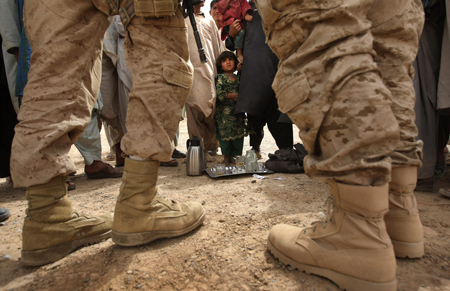
In the end, there was nothing Hamid Karzai could do but give in and agree to a runoff election. International pressure had become too strong. The United States even threatened Karzai saying they would not agree to send more troops to the Hindu Kush until there was a “credible” government in Kabul.
Accompanied by U.S. Sen. John Kerry, U.N. Special Envoy Kai Eide and three other Western ambassadors, Karzai appeared at a press conference to announce the runoff election. The appearance was obviously meant to demonstrate unity.
But the appearance revealed something unwanted: it wouldn’t be the Afghans who would determine the fate of their nation and the legitimacy of their election, it would be the United States and the West. That’s a deadly message. It will no doubt strengthen the idea many Afghans have that the Americans are actually occupiers in disguise whose intention it is to put a puppet government into power that is acceptable to them.
Instead of getting worked up over election fraud, the United States and Europe had better start reconsidering their own role in all this because they, too, are complicit in the electoral debacle. Weeks before election day, it was already obvious that Karzai was planning to commit election fraud on a grand scale. But the international community sat on its hands in silence, doing and saying nothing.
Neither did U.S. Special Envoy Holbrooke distinguish himself here. His attacks drove Karzai into confrontation. It speaks volumes that it was Senator Kerry who had to guide Karzai onto the right path. The Obama White House should seriously question whether Holbrooke is really the right man for the job he was given.
The situation is now so messy that a good solution and a proper exit are all but impossible. The United States was successful in forcing a runoff election in the face of great opposition, even from the United Nations, but whether the world will find it credible is another question entirely. Have no delusions: to the United States, this election is not about democracy. Millions of Afghans are about to be asked to risk their lives once again just so Washington and the West can save face and suppress growing opposition to this war in their own countries.
The USA and Europe used the election as justification to increase the number of troops in the Hindu Kush. That was dangerous and foolish right from the beginning. Success in Afghanistan can only be measured if and when the Afghans can live in peace and terror attacks are eliminated. But to think that a nation with a traditional tribal culture can be transformed into a showpiece of democracy in just eight years has always been nothing but a naïve illusion.
Now it’s all about damage control. The massive electoral fraud deeply shook the public’s confidence in their government and its policies. And the two months of wrangling following the vote did little to enhance the image of democracy, especially since the West meddled so shamelessly in it all. It’s time now for the United States and Europe to try to save what can still be saved.
They must do everything possible to ensure the runoff restores at least a little bit of trust in democracy. In concrete terms, that means the U.S. and its allies have to be far more effective in protecting voters from Taliban attacks than they were in the August 20th election. The international community also has to take greater pains to ensure at least the appearance of less voter fraud; it’s unrealistic to think the runoff will be totally free from irregularities.
Above all, the United States has to avoid acting like a colonial power. It must resist the temptation to meddle in the election. Many Afghans believe Americans want to use the election to put their own man in power. Bush-puppet Karzai apparently fears the Obama administration will try to steal the election from him and install his opponent, Abdullah. It’s unclear at present whether these rumors are true or not.
Karzai is by no means a shoo-in. The race with Abdullah is closer than had been first thought; otherwise Karzai wouldn’t have fought a runoff so vehemently for two months. But deciding on a president is a matter for the Afghans, not the Americans. Someone should remind Richard Holbrooke of that fact.

Leave a Reply
You must be logged in to post a comment.